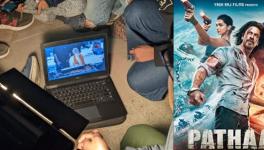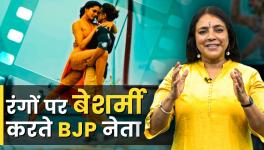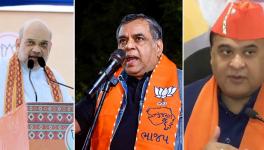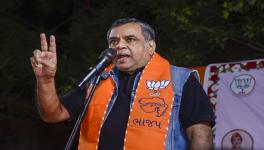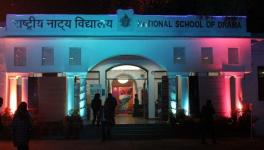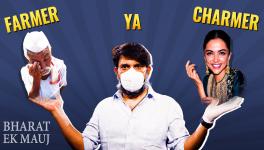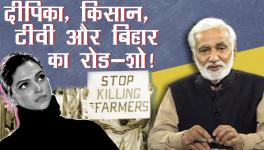Why Deepika Visited JNU and Pro-Govt Bollywood Hated it
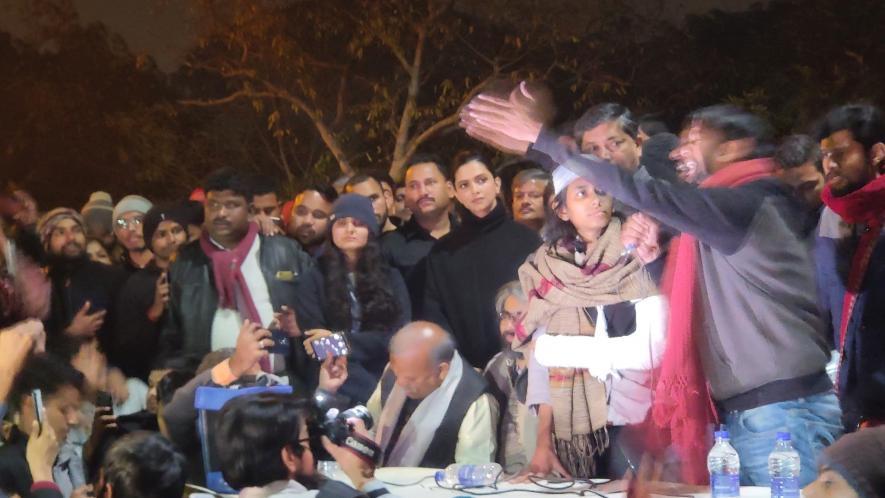
The surprise visit of Bollywood superstar Deepika Padukone to the elite Jawahar Lal University campus on Tuesday night has divided the film fraternity. Students from Puducherry to Oxford have risen in protest and solidarity with JNU students ever since an attack on them by a group backed by the ruling Bharatiya Janata Party (BJP) on Sunday.
Young men, and a few women, said to belong to the Akhil Bharatiya Vidyarthi Parishad (ABVP), violently attacked dozens of JNU students—including a student who cannot see—and teachers with rocks, sledgehammers and sticks over the weekend. Deepika’s visit to JNU was widely seen as an expression of solidarity with the students who came under attack.
Padukone, 34, was in the national capital as part of a campaign to promote her upcoming film, Chhapaak. She also ended up attending a public meeting at JNU campus, which had been called by the JNU Teacher’s Association. She made no speeches.
But even before Deepika could leave the university premises, a furious debate was sparked off on social media over her visit. The rage was over the fact that Deepika is the only Bollywood personality who has, so far, chosen to stand with JNU students. Notably, Bollywood’s top male actors, the three Khans, Shah Rukh, Salman and Aamir, have maintained complete silence when young India is out on the streets. Meanwhile, other stars and key figures of the film industry have opposed the violent attack on JNU students. Yet it is Padukone who towers over them in terms of popularity and visibility on social media.
The Twitterati, always quick to take sides, floated hashtags such as #SupportDeepika and #BoycottChhapaak. In movie-mad India, Deepika, a badminton player turned actor, enjoys a significant social media presence with a whopping 26 million followers on Twitter and another 42 million on Instagram. In 2016, Forbes ranked Deepika the 10th-highest paid actress in the world. In 2018 she became the first woman to reach number 4 on the ‘Forbes India Celebrity 100’ list.
The mega-star has acted in nearly three dozen films and is considered a sensitive actor who has played roles of people who, because of a physical disability or depression, are struggling in society. She is also the only mega-star in India who has acknowledged the debilitating effect that depression has had on her own life. By speaking out about depression, an issue that is usually buried under the carpet or denied in India, she set herself apart from other Bollywood stars. No doubt, it is her courage, accompanied with her sensitivity, that had the Bollywood diva visit JNU.
In the context of depression, Deepika has said that overcoming it was a struggle. Perhaps her understanding of a personal struggle against a condition that society denies or ignores is what propelled her to stand in solidarity with JNU’s students. For, these students have, no doubt, felt both isolated and had their concerns neglected by the university administration and the Central government, ever since it took charge of the country in 2014.
One section of social media has lauded Deepika for taking a stand and expressing solidarity, while others appealed that her film be boycotted for it. Here, one must not discount the fact that Prime Minister Narendra Modi has often times posed with Bollywood celebrities, and his selfies and group photo-ops with actors and directors are easily found on social media, not to mention a few famous non-political ‘interviews’.
Young India is out on the streets, protesting against the divisive Citizenship Amendment Act (CAA) 2019, the proposed National Register of Indian Citizens (NRIC) and, in the case of JNU, also against a fees hike which a bulk of the students, backed by their union, oppose.
Now that Deepika’s action has once again visibly divided the Hindi film industry into two camps—those who are pro-government, come what may, and those who oppose its draconian and unjustified policies, it is time to look at what the supporters of the government are up to. For instance, it is almost scripted for the government that just about 24 hours after Deepika’s visit to JNU, Bollywood star Juhi Chawla attended a pro-government protest at the Veer Savarkar Smarak in Dadar, central Mumbai, where she came out strongly against people for “constantly criticising the government”. Chawla stretched credulity when she asked protestors to reflect on their own conduct instead of critiquing the government.
As artistes, Chawla feels, it is unfair to be asked questions by the media about news-related events. She said that celebs must not be made to respond to events “just for a reaction” and that they should be given time to truly understand any situation before commenting on it. “We are going to work, thinking how to execute our task, then some incident happens somewhere and suddenly the media asks, ‘what do you think about this?’ We haven’t understood the matter, people haven’t understood the matter but you need a reaction. Let people understand, whether it is NRC or CAA, and what it is about, why is this being talked about,” Chawla said.
It is over a month since the government cleared the CAA, 2019, in both houses of Parliament and got the President’s assent for it. Various government functionaries, especially politicians, have been commenting on the NRIC for much longer—the NRC process undertaken in Assam over the last five years has been making headlines for well over a year and a half. Is not Chawla’s assumption that Padukone and others who oppose the NRIC are still unaware of its essential features, misplaced?
Massive nationwide protests erupted immediately following the CAA’s passage. Even at that time, a few celebrities, such as Farhan Akhtar, Manoj Bajpayee, Anurag Kashyap, Shabana Azmi, Richa Chadha, Huma Qureshi, Ali Fazal, Kabir Khan, Swara Bhasker , Sushant Singh, and Siddharth had attended protests and joined students in raising their voice against CAA. Celebrities such as Paresh Rawal, Anupam Kher, Vivek Agnihotri, producer Ashoke Pandit, who are known to be open supporters of the BJP government, favoured the CAA in their retort.
For a whole month, the CAA-NRC-NRIC issue has been the biggest political obsession for many. This is not just because this government has fed people on false hopes of acchey din [good days] which never materialised, but also because it is their belief that the government has mastered the politics of distraction. It is therefore, not believable when Chawla, and others who share her point of view in the industry, claim that the issue has not been understood.
Arguably, there is no compulsion on Bollywood actors to wrestle with the media, but the battle lines ought to be drawn fairly. It is unrealistic to expect that celebrities will not speak out against what they oppose, even though those who support the government will continue to support it.
The writer is a freelance journalist based in Bhopal. The views are personal.
Get the latest reports & analysis with people's perspective on Protests, movements & deep analytical videos, discussions of the current affairs in your Telegram app. Subscribe to NewsClick's Telegram channel & get Real-Time updates on stories, as they get published on our website.









